Two-day international conference is Indian Knowledge System for Achieving Sustainable Development Goals(ICON 2024) at SMS Varanasi
The eleventh two-day international conference started at SMS Varanasi. The main theme of this two-day international conference is Indian Knowledge System for Achieving Sustainable Development Goals.
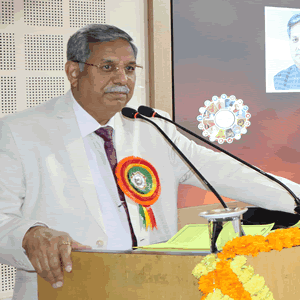 Education Advisor, Uttar Pradesh Government present as chief guest in the inaugural session of the international conference.former chairman Prof. D. P. Singh said that during the time of Covid, many difficulties had to be faced in making the new education policy. He said that self-consciousness is at the core of the new education policy. Today this period is undoubtedly important in building a developed India. He appealed and said that we all need to create such a system in which love for teaching and education develops, only then the goal of a truly developed India can be achieved. Describing Panchsheel Sutra as important for sustainable development, Prof. D. P. Singh said that spirituality centric lifestyle, student centric education, women development centric family, human centric society, India centric world is the demand of the contemporary era. He said that for sustainable development we need to look into the past. Quoting Swami Vivekananda, Prof. Singh said that we have to make the concept of love for learning and love for the learner the core of the new education.
Education Advisor, Uttar Pradesh Government present as chief guest in the inaugural session of the international conference.former chairman Prof. D. P. Singh said that during the time of Covid, many difficulties had to be faced in making the new education policy. He said that self-consciousness is at the core of the new education policy. Today this period is undoubtedly important in building a developed India. He appealed and said that we all need to create such a system in which love for teaching and education develops, only then the goal of a truly developed India can be achieved. Describing Panchsheel Sutra as important for sustainable development, Prof. D. P. Singh said that spirituality centric lifestyle, student centric education, women development centric family, human centric society, India centric world is the demand of the contemporary era. He said that for sustainable development we need to look into the past. Quoting Swami Vivekananda, Prof. Singh said that we have to make the concept of love for learning and love for the learner the core of the new education.
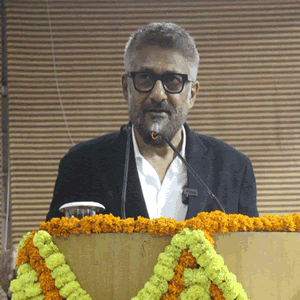 Veteran filmmaker Vivek Ranjan Agnihotri of Kashmir Files film fame was present as a special guest in the conference. While interacting directly with the students, he said that Sanatan is actually not a religion but a qualification, it is like an eternal rule. Describing "Tatvamasi" as the basic mantra, he said that the youth today need to recognize their own capabilities, due to which success is certain. Cautioning the youth to stay away from conservative thoughts, Shri Agnihotri said that it is necessary to include scientific viewpoint in the thoughts. Quoting the Indian knowledge system, he said that the journey of attaining self from ignorance is the essence of life. Describing the concept of secular as an integral part of Indias DNA, he said that merely writing or repeatedly quoting words like socialism, secular is not justice to these concepts and India. Kashi is not just a spiritual city but underlining its role in the freedom struggle, he said that nationalism originated from Maharashtra but it developed in Varanasi and Prayagraj.
Veteran filmmaker Vivek Ranjan Agnihotri of Kashmir Files film fame was present as a special guest in the conference. While interacting directly with the students, he said that Sanatan is actually not a religion but a qualification, it is like an eternal rule. Describing "Tatvamasi" as the basic mantra, he said that the youth today need to recognize their own capabilities, due to which success is certain. Cautioning the youth to stay away from conservative thoughts, Shri Agnihotri said that it is necessary to include scientific viewpoint in the thoughts. Quoting the Indian knowledge system, he said that the journey of attaining self from ignorance is the essence of life. Describing the concept of secular as an integral part of Indias DNA, he said that merely writing or repeatedly quoting words like socialism, secular is not justice to these concepts and India. Kashi is not just a spiritual city but underlining its role in the freedom struggle, he said that nationalism originated from Maharashtra but it developed in Varanasi and Prayagraj.
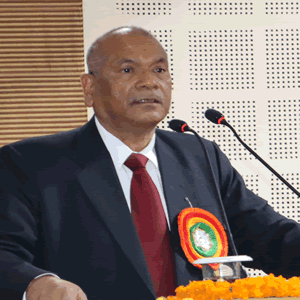 Former D.G.P. of Uttar Pradesh and Chancellor of Noida International University, Prof. Vikram Singh said that India ancient knowledge tradition is rich in all fields including music, dance, literature, art, Ayurveda, psychology, linguistics. Giving examples of literature and poems developed in the western civilization, he said that on one hand, things like betrayal, sorrow, death are clearly visible in their creations, while on the other hand, in the Indian knowledge system, there are positive thoughts like Matri Devo Bhava, Pitra Devo Bhava, Acharya Devo Bhava. Ideas have been given space. Quoting the Vedic mantra, Prof. Vikram Singh said that today in this era of global warming, the need of the hour is that not only the elements contained in the Vedic literature should be explored in the contemporary perspective but emphasis should also be laid on transferring them from generation to generation. Appealing to the students, he said that time management is life management.
Former D.G.P. of Uttar Pradesh and Chancellor of Noida International University, Prof. Vikram Singh said that India ancient knowledge tradition is rich in all fields including music, dance, literature, art, Ayurveda, psychology, linguistics. Giving examples of literature and poems developed in the western civilization, he said that on one hand, things like betrayal, sorrow, death are clearly visible in their creations, while on the other hand, in the Indian knowledge system, there are positive thoughts like Matri Devo Bhava, Pitra Devo Bhava, Acharya Devo Bhava. Ideas have been given space. Quoting the Vedic mantra, Prof. Vikram Singh said that today in this era of global warming, the need of the hour is that not only the elements contained in the Vedic literature should be explored in the contemporary perspective but emphasis should also be laid on transferring them from generation to generation. Appealing to the students, he said that time management is life management.
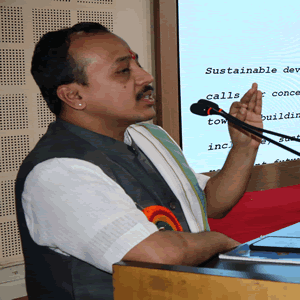
In the two-day international conference, Prof. Vinaychandra Banavathy Director of Indian Knowledge Tradition Center of Chanakya University, Bangalore.Prof. Vinaychandra Banavathy said that there are seventeen sustainable development goals which have been accepted by 191 countries but due to ignoring sustainable development, the growth in the process is only thirty percent. Discussing the three important pillars of sustainable business, Profit, People and Planet, he said that only through these can the declining market system in today global era be managed. Pro. Banawati said that the Indian knowledge system is not an option but a demand of today times.
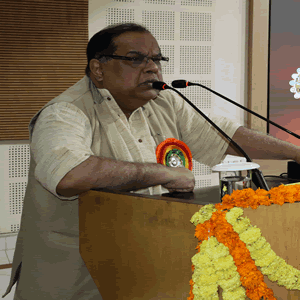 Guest of Honour Prof. of I.I.M (Shillong). Sanjoy Mukherjee said that it is important to look at modern science from the perspective of Vedic knowledge. Actually, translation of Vedas has been seen only in relation to religious activities. Said that the existence of humanity cannot be imagined without culture. Describing the ancient Indian knowledge stream as being in the interest of the world, Professor Singh said that the concept of Vasudhaiva Kutumbakam and Sarve Bhavantu Sukhinah, Sarve Santu Niramaya make Indian knowledge global. He said that the global outlook of knowledge has been the reason for the survival of this oldest civilization even today. He told that only biological solution to biological problem can save us from all the problems. Asking questions is the basis of Indian knowledge tradition.
Guest of Honour Prof. of I.I.M (Shillong). Sanjoy Mukherjee said that it is important to look at modern science from the perspective of Vedic knowledge. Actually, translation of Vedas has been seen only in relation to religious activities. Said that the existence of humanity cannot be imagined without culture. Describing the ancient Indian knowledge stream as being in the interest of the world, Professor Singh said that the concept of Vasudhaiva Kutumbakam and Sarve Bhavantu Sukhinah, Sarve Santu Niramaya make Indian knowledge global. He said that the global outlook of knowledge has been the reason for the survival of this oldest civilization even today. He told that only biological solution to biological problem can save us from all the problems. Asking questions is the basis of Indian knowledge tradition.
Welcoming the guests in the inaugural session of the two-day international conference, SMS Varanasi Director Prof. P.N. Jha said that SMS. Varanasi is conscious not only about academics but also about its responsibility towards the society. Describing Mahabharata, Geeta and Ramayana as relevant in the modern context, he said that knowledge is primarily a means of purification. He also discussed Maslows theory and said that today things like food and shelter are in demand at the global level and the solution to this demand and discrepancy lies in the ancient Indian knowledge tradition.
On this occasion, a souvenir based on Indian knowledge system for achieving sustainable development goal was also released. The inaugural session was conducted by Dr. Bhavna Singh and the vote of thanks was given by Prof. Avinash Chandra Supkar. On the first day of the two-day international conference, three different technical sessions were also organized in which about 200 participants from India and abroad presented research papers. On this occasion, Dr. M.P. Singh, Executive Secretary of SMS, Varanasi, Director Prof. P.N. Jha, Registrar Mr. Sanjay Gupta, Conference Coordinator Prof. Avinash Chandra Supkar, Prof. Sandeep Singh, Prof. Rajkumar Singh and all the teachers and staff were present.
![]()
The Eleventh International Conference on Indian Knowledge System for Achieving Sustainable Development Goals organized by the School of Management Sciences concluded. Ramashish Singh, national in-charge of Pragya Pravah magazine, who was present as the chief guest in the closing session, said that the interest of all humanity lies in knowledge, science and philosophy. India has a tradition of knowledge for the welfare of people since about 5,000 years ago. He said that it is mentioned in the Gyan Sukta of Rigveda that names of substances were kept in the initial state. This is the first stage of knowledge. Their faultless knowledge about the qualities of things, religion etc. remains hidden in the cave of experience and is revealed only through inner inspiration. The Vedic period is the dawning period of knowledge and philosophy. This tradition forms the world first knowledge table in the four Vedic codes including the Rigveda. Shri Singh said that India knowledge tradition is unique and first in the world. Due to time and circumstances, there were obstacles in the flow of this knowledge tradition. Presenting the example of Geeta,. The sages have known this knowledge through tradition. This knowledge got destroyed in the flow of time. Actually, Shri Krishna was talking about reviving the ancient knowledge tradition.
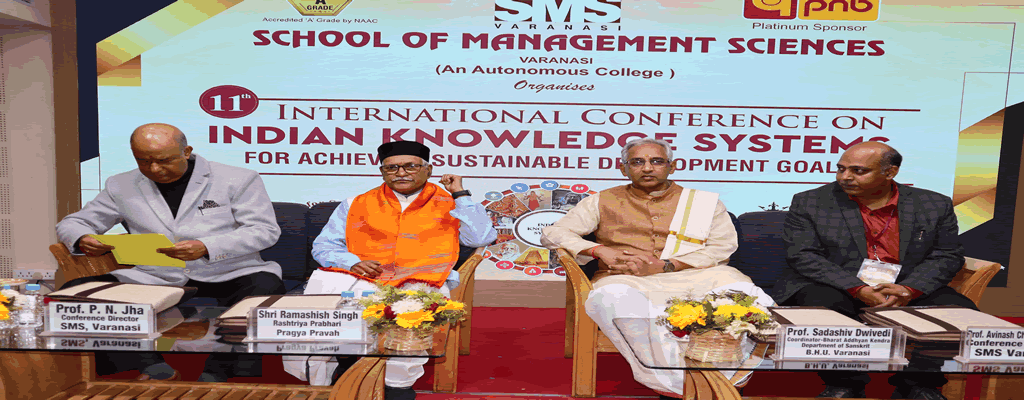
Present as a special guest in the closing session was Coordinator of Sanskrit Department and India Study Centre, BHU. Prof. Sadashiv Dwivedi said that education, health and environment are important in the concept of sustainable development. Underlining the importance of worship of nature in Vedic era India, Prof. Dwivedi said that in the era of global warming, today India is presenting solutions for the entire world at global level and the origin of these solutions lies in Vedic literature. In India, Takshashila, Nalanda, Vikramshila, Vallabhi, Ujjaini, Kashi etc. were world famous centers of education and research. He said that today there is a need to make the forgotten Sanatan Gyan tradition a part of active memory so that it can again guide the world in the role of a world leader. While classifying Indian knowledge, Prof. Dwivedi said that metaphysics, epistemology and epistemology are the main parts of Indian knowledge. In all these streams of knowledge, nature-centric experience was kept paramount.
Welcoming the guests, the Director of the Institute, Prof. P.N. Jha, establishing coordination between the new education policy and the Indian knowledge tradition, said that the new education policy includes all those elements of ancient Indian knowledge which are necessary for multifaceted human development. Is necessary. He said that although many positive aspects have been included in the new education policy, but promoting Indian languages is the most important feature of this policy. Prof. Jha described zero hunger as necessary for sustainable development.
In the technical session of the second day of the two-day international conference, Swami Revati Kant, the head teacher trainer of Gyan Shakha - Bhakti Marg from Germany, while explaining the Brahma Sutra, said that life is not made of materialism but of spiritual elements. He said that love is service which is clearly reflected in mothers love. Quoting Indian wisdom, he said that there is no special difference between religion and work, but whatever work brings joy in performing it is religion. International yoga guru Dr. Rajesh Kumar Mishra of ISKCON Mumbai said that Vedic knowledge is the main knowledge stream. In fact, the Gurukul system was established only for overall development. Dr. Mishra said that the results of sustainable development can be easily achieved by practicing yoga.
It is noteworthy that Commerce Research Review magazine was also released in the inaugural session of the conference. The concluding session was conducted by Prof. Pallavi Pathak and conference coordinator Prof. Avinash Chandra Supkar gave the vote of thanks. On the second day of the two-day international conference, eight different technical sessions were also organized in which about 500 participants from India and abroad presented research papers. On this occasion, SMS, Varanasi Executive Secretary Dr. M.P. Singh, Director Prof. P.N. Jha, Registrar Mr. Sanjay Gupta, Conference Coordinator Prof. Avinash Chandra Supkar, Prof. Sandeep Singh, Prof. Raj kumar Singh and all the teachers and staff were present.
